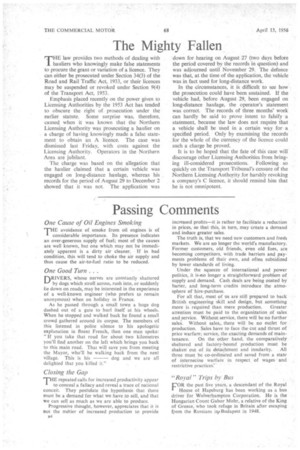The Mighty Fallen
Page 38

If you've noticed an error in this article please click here to report it so we can fix it.
'THE law provides two methods of dealing with 1 hauliers who knowingly make false statements to procure the grant or variation of a licence. They can either be prosecuted under Section 34(3) of the Road and Rail Traffic Act, 1933, or their licences may be suspended or revoked under Section 9(4) of the Transport Act, 1953.
Emphasis placed recently on the power given to Licensing Authorities by the 1953 Act has tended to obscure the right of prosecution under the earlier statute. Some surprise was, therefore, caused, when it was known that the Northern Licensing Authority was prosecuting a haulier on a charge of having knowingly made a false statement to obtain an A licence. The case was dismissed last Friday, with costs against the Licensing Authority. Operators in the Northern Area are jubilant.
The charge was based on the allegation that the haulier claimed that a certain vehicle was engaged on Jong-distance haulage, whereas his records for the period of August 29 to December 2 showed that it was not. The application was down for hearing on August 27 (two days before the period covered by the records in question) and was adjourned until November 29. The defence was that, at the time of the application, the vehicle was in fact used for long-distance work.
In the circumstances, it is difficult to see how the prosecution could have been sustained. If the vehicle had, before August 29, been engaged on long-distance haulage, the operator's statement was correct. The records of three months' work can hardly be said to prove intent to falsify a statement, because the law does not require that a vehicle shall be used in a. certain way for a specified period. Only by examining the records for the whole of the currency of the licence could such a charge be proved.
It is to be hoped that the fate of this case will discourage other Licensing Authorities from bringing ill-considered prosecutions. Following so quickly on the Transport Tribunal's censure of the Northern Licensing Authority for harshly revoking a company's C licence, it should remind him that he is not omnipotent.




















































































































